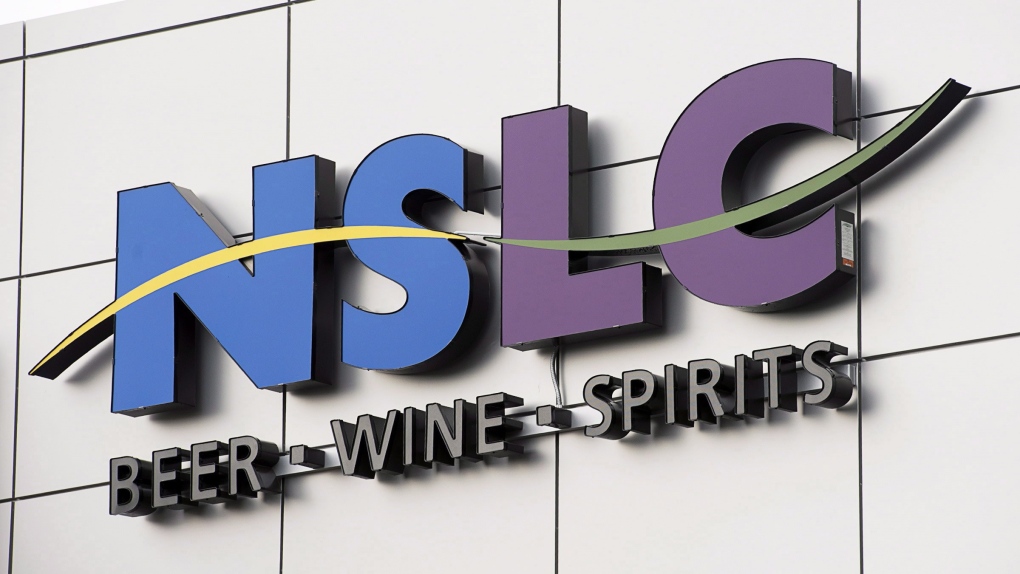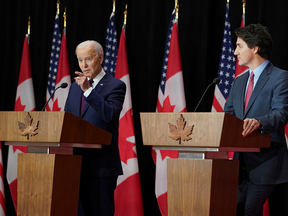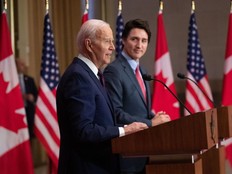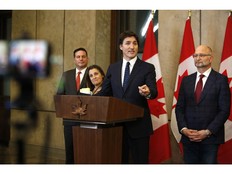March 31 (Reuters) - Canada on Friday approved Rogers Communications Inc's C$20 billion ($14.8 billion) buyout of Shaw Communications after securing commitments from them to promote competition in a market with some of the highest wireless bills in the world.
The final nod from Minister of Innovation, Science and Industry Francois-Philippe Champagne capped two years of antitrust uncertainty and paves the way for the creation of Canada's No. 2 telecoms firm.
The deal was opposed by consumer advocates and politicians on worries it could lead to higher prices due to an overlap between Rogers and Shaw's wireless divisions.
On Friday, Champagne agreed to the transfer of wireless licenses held by Shaw's Freedom Mobile unit to Quebecor Inc-owned (QBRb.TO) Videotron - a proposal that helped resolve antitrust concerns.
Champagne has secured a commitment from Videotron that it will offer plans at least 20% cheaper than competitors and invest C$150 million to upgrade Freedom Mobile's network in the next two years, or risk a fine of up to C$200 million.
Rogers made 21 conditions, including setting up a western headquarters in Calgary, creating 3,000 new jobs in Western Canada and investing C$5.5 billion to expand 5G coverage and services.
If it breaches the commitments, Rogers (RCIb.TO) will have to pay a fine of as much as C$1 billion, Champagne said at a news conference in Ottawa.
When asked about how these commitments will be enforced, Champagne said, "I will (enforce it). Am a lawyer and it's a contract, I know how to read a contract and enforce them. And it's subject to arbitration."
Champagne said if wireless prices do not go lower, he would seek further legislative and regulatory powers.
FREEDOM SALE
The merger unites two of Canada's wealthy families whose companies have for long fought for market share.
"Today begins an exciting new chapter for the future of connectivity in Canada,” said Brad Shaw, CEO of Shaw, in a statement.
While Champagne said the sale of Freedom Mobile to Videotron would create another major national player and help lower prices, consumer advocacy groups were not convinced.
Rosa Addario, a spokesperson for internet advocacy group OpenMedia, said the concessions sought by the government were unlikely to result in lower prices.
"This is undoubtedly going to harm our competition, our choice and will make our bills more expensive," Addario said.
Shares of Shaw rose more than 3% to C$40.43, just below the offer price of C$40.50. Rogers was down 1.6%.
The Rogers-Shaw merger had faced intense opposition from Canada's antitrust regulator whose efforts to block it were rejected by the Competition Tribunal and a Canadian court.
Its approval now paves the way for the deal to close on April 7, after the completion date was delayed for a fifth time.
The combined company will benefit from Rogers' strong presence in urban Ontario and Shaw's dominance in the sparsely populated regions of Western Canada. ($1 = 1.3535 Canadian dollars)
Our Standards: The Thomson Reuters Trust Principles.
https://news.google.com/rss/articles/CBMiY2h0dHBzOi8vd3d3LnJldXRlcnMuY29tL21hcmtldHMvZGVhbHMvY2FuYWRhcy1kZWNpc2lvbi1yb2dlcnMtc2hhdy1kZWFsLW1heS1jb21lLWZyaWRheS0yMDIzLTAzLTMxL9IBAA?oc=5
2023-03-31 20:45:00Z
1887914412














Comments
Postmedia is committed to maintaining a lively but civil forum for discussion and encourage all readers to share their views on our articles. Comments may take up to an hour for moderation before appearing on the site. We ask you to keep your comments relevant and respectful. We have enabled email notifications—you will now receive an email if you receive a reply to your comment, there is an update to a comment thread you follow or if a user you follow comments. Visit our Community Guidelines for more information and details on how to adjust your email settings.
Join the Conversation